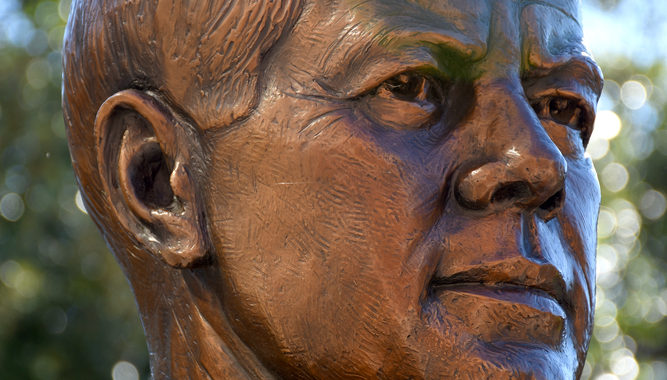The Great Debates – Civil Rights Act of 1964
LISTEN ON SOUNDCLOUD:
On June 11, 1963, President John F. Kennedy issued his Report to the American People on Civil Rights, calling on Congress to pass a civil rights bill to address discrimination and segregation against African Americans. Kennedy’s civil rights bill included a ban on discrimination in places of public accommodation and tackled segregation in schools, but did not address many other issues affecting African Americans, especially in the South. Kennedy was assassinated before the bill was approved by Congress. President Lyndon B. Johnson made passage a priority.
The Congressional Debates
Prior to his televised appearance to discuss his Report, President Kennedy met with Congressional Republicans to discuss the legislation. On June 13, 1968, Senate Minority Leader Everett Dirksen and Senate Majority Leader Mike Mansfield expressed support for Kennedy’s proposal, except for the portion dealing with public accommodations. President Kennedy submitted his bill as originally drafted to Congress on June 19th. The House Judiciary Committee discussed the bill and held hearings, adding provisions to the bill to enhance protections. In addition, the Judiciary Committee added Title III, which authorized the Attorney General to pursue legal remedies.
In late October, Kennedy met with the House leadership to figure out a path to sufficient votes for House passage. The House Judiciary Committee reported the bill out in November and referred to the Rules Committee, chaired by Virginian Howard W. Smith, a segregationist, who promised that the bill would not emerge from his committee. On November 22, 1963, President Kennedy was assassinated and LBJ was sworn in as President. President Johnson supported the bill and used his experiences in the Senate to find ways to ensure passage.
On November 27, 1963, President Johnson made clear his position on passage of the civil rights bill when he made his first joint session of Congress, stating:
“No memorial oration or eulogy could more eloquently honor President Kennedy’s memory than the earliest possible passage of the civil rights bill for which he fought so long.”
In a rare parliamentary procedure, Judiciary Committee Chair Emanuel Celler filed a petition to discharge the bill from the Rules Committee and the premises of Chair Smith. When the winter recess arrived, the petition was short of required signatures. Upon return from recess, sensing the strong support in the North for the bill, Smith permitted the bill to pass through his Rules Committee.
President Johnson then navigated the Senate. The Senate Judiciary Committee Chair James O. East land, a Democrat from Mississippi, strongly opposed the bill. Senator Mansfield invoked a procedural tool to avoid referral to the Judiciary Committee, reading the bill a second time after it had initially been waived, permitting the bill to reach the Senate floor directly for debate.
On March 30, 1964, the bill came for debate on the Senate floor. The Southern Bloc implemented a filibuster, led by Senator Richard Russell, a Democrat from Georgia, who stated:
“We will resist to the bitter end any measure of movement which would have a tendency to bring about social equality and intermingling and amalgamation of the races in our states.”
Senator Strom Thurmond, who had set a record filibuster of more than twenty-four hours against the Civil Rights Act of 1957, strongly opposed the bill, stating:
“This is the worst civil-rights package ever presented to the Congress and is reminiscent of the Reconstruction proposals and actions of the radical Republican Congress.”
The filibuster continued for 54 days. Finally on June 10, 1963, Senator Robert C. Byrd finished his 14 hours, 13 minutes speech. Senator Russell made final opposition comments, then Senator Dirksen from Illinois spoke for the bill proponents, declaring, “the time has come for equality of opportunity in sharing government, in education, and in employment. It will not be stayed or denied. It is here!” During roll call on cloture, Senator Clair Engle from California did not respond verbally, having lost his ability to speak from a brain tumor. However, he pointed to his eye to affirmatively vote. Cloture passed, 71 to 29, four more votes than needed for cloture.
The resulting vote on cloture of the filibuster was the first time in the Senate’s history that a filibuster on a civil rights bill had been brought to cloture.
On June 19, the compromise bill passed the Senate, 73-27, and then quickly passed through the House-Senate Conference Committee. On July 2, 1964, President Johnson signed the law, and the long road to passage was complete.
Despite its historic nature, the Civil Rights Act of 1964 had limited impact at the time of its passage, but has been influential on subsequent civil rights bills and was upheld generally in the Supreme Court decision, Heart of Atlanta Motel v. United States.
Dan Cotter is a partner at Latimer LeVay Fyock LLC and an adjunct professor at The John Marshall Law School, where he teaches SCOTUS Judicial Biographies. He is in the process of writing a book on the seventeen Chief Justices. He is also a past president of The Chicago Bar Association. The article contains his opinions and is not to be attributed to anyone else.
Click Here to have the NEWEST essay in this study emailed to your inbox every day at 12:30 pm Eastern!
Click Here for the previous essay.
Click Here for the next essay.
Click Here to view the schedule of topics in our 90 Day Study on Congress.




Join the discussion! Post your comments below.
Your feedback and insights are welcome.Feel free to contribute!